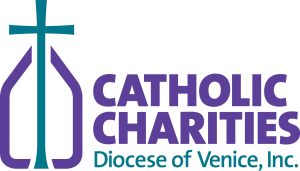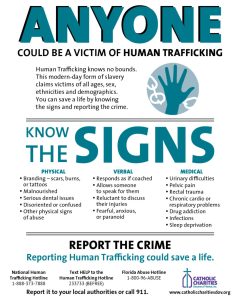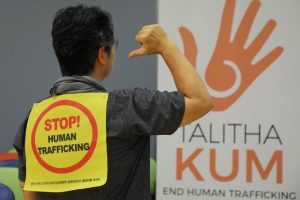The worst nightmare of a human being who has been trafficked is of the possibility of getting caught in that dark world once again. Rescue, stability and confidence allow these victims to transition into a productive life of self-sufficiency free from fear.
 Add the COVID-19 Pandemic into the mix and many who were far along in the process into leading a “normal” life free from fear, are now at high risk of being trafficked again.
Add the COVID-19 Pandemic into the mix and many who were far along in the process into leading a “normal” life free from fear, are now at high risk of being trafficked again.
“All at once, everyone was in crisis mode, even those we thought were doing well,” explained Erika Pineros, Catholic Charities Anti Human Trafficking Assistance Program Director. “They were already vulnerable, then everyone lost their job.”
Local, state and federal programs designed to assist people during the Pandemic are not available to most survivors of human trafficking primarily because of immigration documentation issues or a past criminal history that was part of their victimization, Pineros added. “That is where Catholic Charities steps in.”

There are currently 63 clients now being assisted by the Catholic Charities program. While that number may seem high, it is average, the difference, of course, is that instead of a portion of that number being phased into self-sufficiency, all 63 are now in crisis. While they are all not recently rescued survivors, some are seeking help for the first time in two years and they are in desperate need of emergency assistance to prevent homelessness and starvation.
The Anti Human Trafficking Assistance Program provides clients with food and clothing; shelter at a safe distance from the site of the exploitation and transitional housing; coordination of medical services; supportive counseling and further mental health services as needed; orientation to state and federal laws and benefits; assistance with benefit applications; coordination of educational and English as a second language (ESL) services; liaison with law enforcement and immigration service providers; as well as coordination with various community agencies for other required services.
Catholic Charities has some transitional housing it operates, but those units are full, Pineros said. “The demand is always high, so we try to make arrangements for other shelter, but the Pandemic is limiting the number of people at shelters and other transitional housing locations thus decreasing the options.”
Survivors enter the program with nothing, and most can only work jobs in the service industry where the pay is not very good, Pineros added. In normal times, when a job doesn’t work out or they face some other obstacle, there are other options.

“Now they feel like they are back to square one because they don’t know from where the next job will come or what their future holds,” Pineros said. “They are now isolated, and many are very afraid of being caught up in trafficking again.”
That fear is real and the need for mental health counseling because of renewed mental trauma has dramatically increased. While in-person counseling is ideal, it is not possible during the Pandemic. These services have transitioned into video- or tele-mental health. To participate, clients often need added assistance to have access to smart devices, or even how to use them.
Pineros said her team of three has been assisting in helping the survivors non-stop and immediate need is money to pay bills.
While the program receives grants to help victims of human trafficking, there are restrictions on what it can be used for.
“The money people give to Catholic Charities and directly to our program, gives us the flexibility to make a real difference,” Pineros said. “Right now, there is no light at the end of the tunnel for these survivors. They are living day-by-day and week-to-week. We are trying to get them through this crisis, but we need more help because human trafficking doesn’t discriminate, and it isn’t going away.”
To support the Catholic Charities, please visit www.catholiccharitiesdov.org and to learn more about the Anti Human Trafficking Assistance Program, you can contact Erika Pineros at erika.pineros@catholiccharitiesdov.org.





